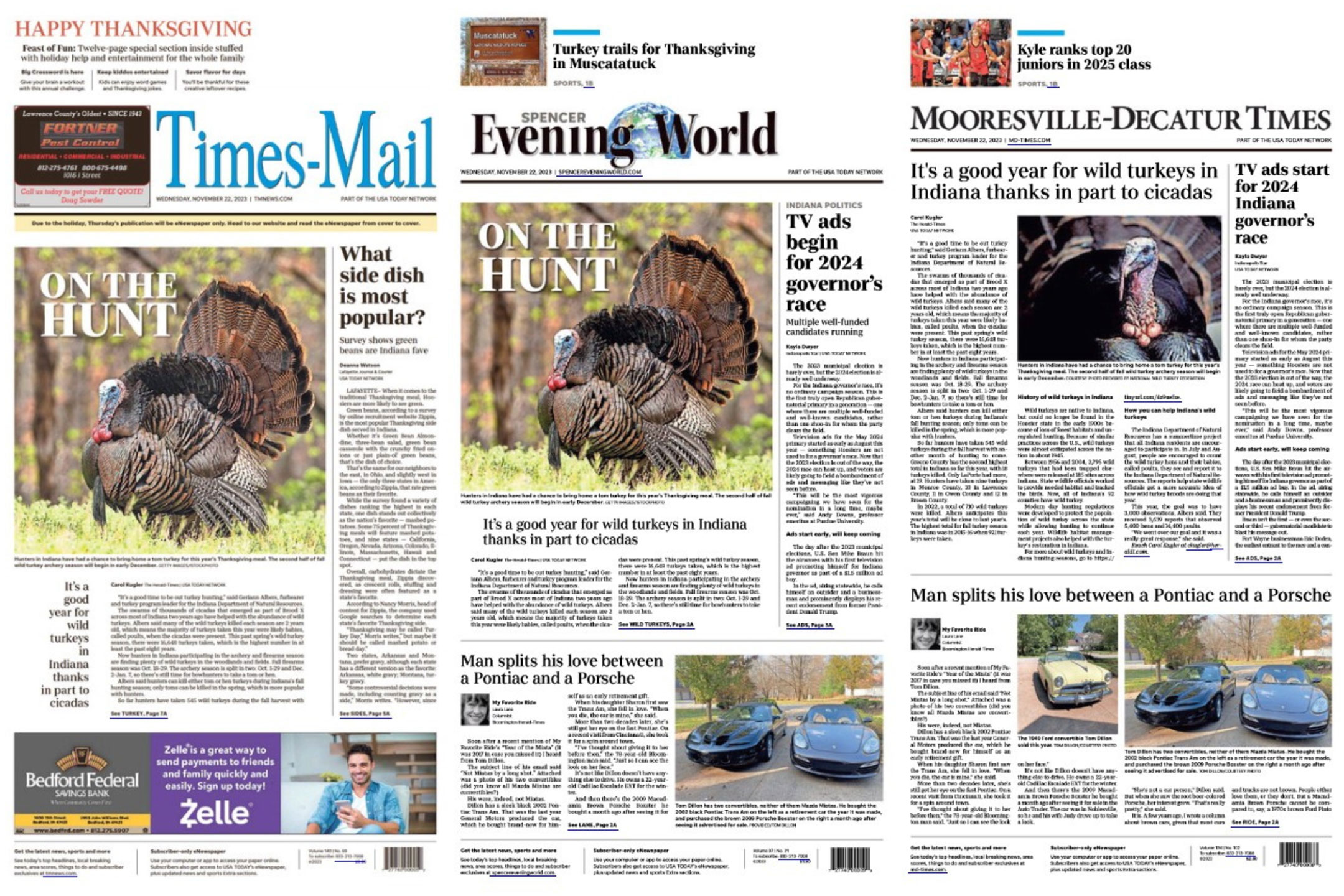Chapter 7
Local case study: Morgan County citizens fight back with newspaper
Stephen Crane and a group of local investors have launched the Morgan County Correspondent to offset the loss of all local journalists by the Gannett-owned legacy newspaper.
Sarah Vaughan
Stephen Crane proudly showed off the press plates from The Morgan County Correspondent’s inaugural edition in August:
“We’re bringing back print!” he proclaimed.
Crane, managing editor of the Correspondent, rallied community support to create a weekly newspaper solely dedicated to Morgan County news after watching two area papers — the Mooresville Decatur-Times and The Reporter Times in Martinsville — be reduced to ghost papers after being bought by GateHouse, now known as Gannett.
“People want to know what's going on, particularly cops and courts, and all of these traditional beats were sort of being revamped and repackaged.”
He’s part of a grassroots movement working to fill a growing information gap in his home county by restoring local news coverage and local investment in it.
Crane had witnessed the changes in the two newspapers firsthand. Hired in 2017 to run both for Schurz Communications, he oversaw a newsroom of seven full-time staff members providing what he refers to as the meat-and-potatoes coverage locals want: city and county government, schools, businesses, sports, 4-H clubs.
But once the papers changed hands to GateHouse on Feb. 1, 2019, and then Gannett that fall, Crane said “it became clear pretty quickly that corporate ownership was going to be detrimental.”
He described a shift in priorities away from traditional elements of community journalism, such as local government meetings, and toward coverage that would guarantee clicks online, especially restaurants, arts, and entertainment stories.
“People want to know what's going on, particularly cops and courts, and all of these traditional beats were sort of being revamped and repackaged,” he said.
A training memo provided by a former Gannett employee spelled it out:
“Topics that don’t work – Just walk (if not run) away!” it read. Top of the list was “advances on events, workshops, library events, fundraisers” followed by press releases from community organizations, local sports, opinion pages and community calendars. (Also, no more mug shots.)
“It's all the bread-and-butter, heart-and-soul stuff that makes a community newspaper!” Crane said. He was particularly disappointed over the lost opinion pages.
“We need, you know maybe once a week, an opinion page. This is the marketplace of ideas for the community, and we are undermining that marketplace…that exchange of ideas, particularly for community matters to be sort of thrown out there for everybody to chew on.”
The number of days the papers were published was also reduced, and by November of 2022, a lone sports reporter was the only staff member. He left in early spring of 2023. The building that housed these once vibrant community centerpieces was sold.

The Bedford Times-Mail, Spencer Evening World, and Mooresville-Decatur Times ran the same stories on their front pages, all published Wednesday, Nov. 22, 2023.
“By and large, we got empty platitudes about producing local journalism that matters,” he said. “That never translated at the local level relative to the resources required. If you're wanting to produce local journalism that matters, you need people to do that… so the resources continued to dwindle while the platitudes were maintained, and so I cannot express enough what a challenge it was.”
Crane and some community investors wanted to buy back their hometown paper. They approached a contact with Gannett’s corporate operations to see if the company was open to the idea. Initially, the response was positive.
“And so yeah, we were dancing on the ceiling, happy about it,” Crane said. “And then he got let go in a corporate restructure mere weeks later. And the next guy said ‘On second thought, not for sale.’ And that's been the message ever since.”
Crane appears energized by his current challenge, though. You can see it in his movements and the way he talks. He’s a man on a mission: creating a local newspaper of record dedicated to true community journalism.

Stephen Crane
Planning and producing the newspaper fill most of Crane’s week: Monday and Tuesday are heavy production days, Wednesday the paper is printed in Greenfield, Thursday it’s distributed, and on Friday, Crane plans the next week’s content and firms up advertising. There’s a digital version as well to plan and maintain. He’s assisted by a “small but mighty” crew – a couple of paid staff plus stringers and community correspondents.
The Mooresville Decatur-Times and The Reporter Times papers had a history of family ownership going back decades. Similarly, Morgan County Correspondent, LLC, is backed by a diverse group of nine community members who have invested tens of thousands of dollars each, according to Crane.
“That includes three attorneys, a funeral director, a paleontologist, a college student, a civil engineer, myself, and a retired Sergeant Major from the Indiana National Guard.”
It was important, he said, to have six months’ worth of operating funds in hand before launching the venture. At a “soft debut” at the county fair in July, the community’s excitement was palpable. Six hundred twenty-three subscribers signed up before the first edition went to press, Crane said, and another 220 subscribers signed on by the time the second edition went out.
“They were in the news desert that is Morgan County and wanted a drink,” he said.
People do, in fact, want local news in print, Crane said. He points to readability studies comparing print and digital. When it comes to retention, knowledge base, user experience… “in every category print wins!” Crane states. “Science is on our side.”
“Modern convention says it's a digital world and a digital future,” he said. “I respectfully disagree with that assessment and certainly the ownership group disagrees with that assessment. We are all in on a print product. Now we certainly have a website. We certainly have social media. But we want a strong print newspaper week in, week out. And then almost as part of retraining the public: ‘Guess what! This is a more enjoyable experience. You just don't know it yet.’”
Chapter 8: Local case study: Owen County citizens, Community Foundation step in »
•••
Officials at Gannett would not talk to WFIU/WTIU for these stories. They sent a statement attributed to Jill Bond, news director of The Herald-Times.
Paper Cuts The reporting is supported by a grant from the Poynter Institute, a non-profit journalism school and research organization in St. Petersburg, Fla., and the Omidyar Network.









